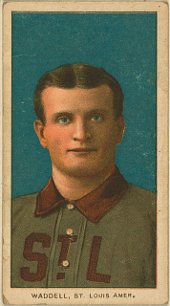
1903 in the life of erratic pitcher Rube Waddell, cataloged by Cooperstown historian Lee Allen:
“He began that year sleeping in a firehouse in Camden, New Jersey, and ended it tending bar in a saloon in Wheeling, West Virginia. In between those events he won 22 games for the Philadelphia Athletics, played left end for the Business Men’s Rugby Football Club of Grand Rapids, Michigan, toured the nation in a melodrama called The Stain of Guilt, courted, married and became separated from May Wynne Skinner of Lynn, Massachusetts, saved a woman from drowning, accidentally shot a friend through the hand, and was bitten by a lion.”
And that was just 1903. In one game against the Athletics, Waddell was at bat in the eighth inning with two out and a tying run on second. The catcher threw to second, trying to pick off the runner, but overthrew, and the ball went into the outfield. The runner took off for home. As he rounded third, the center fielder hurled the ball in to home plate …
… and Waddell, to everyone’s horror, knocked it out of the park.
He was declared out for interference. “They’d been feeding me curves all afternoon,” he told a flabbergasted Connie Mack, “and this was the first straight ball I’d looked at!”



